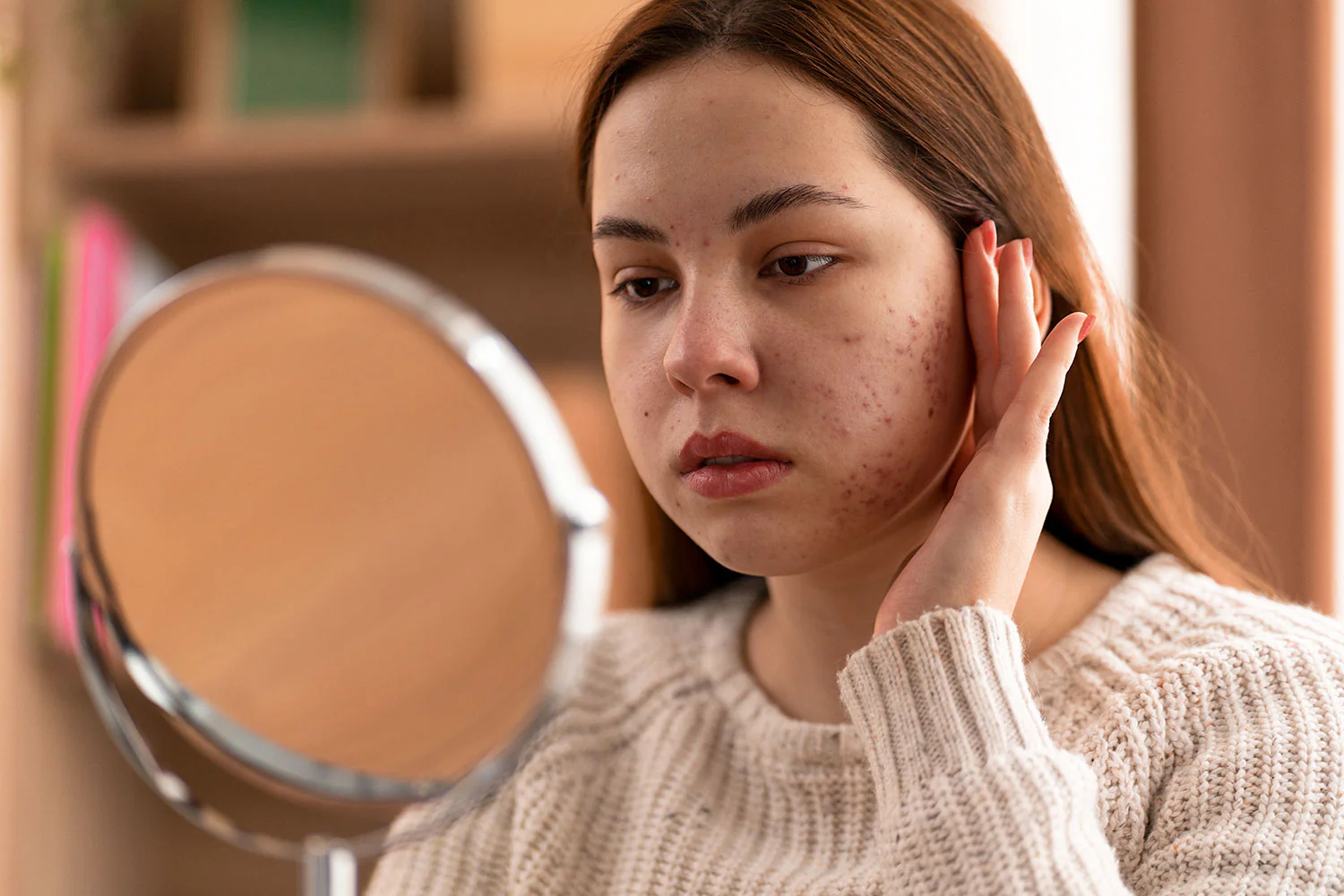How Stress Affects Your Skin and How to Combat It
Stress isn’t just a mental burden; it can also take a toll on your skin. From acne flare-ups to premature aging, the connection between stress and skin health is real and scientifically proven. In this article, we’ll explore how stress impacts your skin, the common skin problems it causes, and practical ways to reduce stress and combat its effects on your skin. How Stress Affects Your Skin and How to Combat It?

The Surprising Connection Between Stress and Skin Health
When you’re stressed, your body produces higher levels of cortisol, the hormone responsible for your fight-or-flight response. Unfortunately, this increase in cortisol doesn’t just affect your mood; it also impacts your skin. Stress can trigger inflammation, reduce your skin’s ability to repair itself, and even worsen existing skin conditions. So, understanding how stress affects your skin is the first step in combating its effects.
How Stress Impacts Your Skin: The Science Behind It
Stress affects your skin in several ways. Elevated cortisol levels lead to increased oil production, which can clog pores and result in stress acne. Additionally, stress causes inflammation, which can worsen conditions like stress-induced eczema and rosacea. Over time, chronic stress can even speed up skin aging, as cortisol breaks down collagen, the protein responsible for keeping your skin firm and youthful.
Understanding the science behind these changes can help you take more proactive steps to protect your skin from stress.
Common Skin Problems Caused by Stress

Stress can manifest on your skin in various forms. Here are the most common skin problems caused by stress:
1. Acne Breakouts
Stress stimulates the production of oil (sebum), which can lead to clogged pores and stress acne. Acne may appear on the face, chest, or back, making it difficult to keep your skin clear.
2. Premature Aging
Chronic stress leads to the overproduction of cortisol, which weakens the skin’s collagen, causing wrinkles and fine lines to form faster. This skin aging can make you look older than you feel.
3. Dullness and Dryness
Stress can affect your skin’s natural moisture balance. When you’re stressed, your skin may lose its healthy glow, becoming dry and irritated.
4. Eczema Flare-Ups
For those with eczema, stress can exacerbate symptoms. The increased inflammation triggered by stress can lead to itchy, inflamed patches of skin that are difficult to manage.
Stress and Your Skin’s Ability to Heal: What You Need to Know
When you’re under stress, your skin’s ability to repair itself is significantly weakened. Cortisol suppresses the immune system and slows down skin regeneration. As a result, minor skin issues like acne or cuts may take longer to heal, and stress-induced skin damage can become more severe over time.
Fortunately, there are ways to promote healing and restore your skin’s natural barrier function.
The Role of Cortisol in Skin Aging and Breakouts
Cortisol is a double-edged sword. On one hand, it helps your body manage stress, but on the other hand, it can wreak havoc on your skin. Cortisol and skin aging go hand in hand because cortisol breaks down collagen, the protein responsible for skin elasticity. This results in sagging, wrinkles, and the loss of firmness. Additionally, stress acne is common because cortisol increases oil production, which leads to clogged pores and breakouts.
To counteract these negative effects, it’s essential to reduce stress and implement a skincare routine that helps boost collagen and control oil production.
Ways to Combat Stress-Induced Skin Issues
Now that you understand how stress affects your skin, let’s dive into some practical ways to combat stress-induced skin problems.
1. Stress Management Techniques
The first and most effective step in combating stress-related skin issues is to manage your stress levels. Try incorporating mindfulness practices like meditation, yoga, or deep breathing exercises into your daily routine. These can help lower cortisol levels and promote overall wellness, both for your mind and skin.
2. Get Enough Sleep
Sleep is crucial for skin repair and stress management. Lack of sleep can exacerbate stress acne, dullness, and other skin problems. Aim for 7-9 hours of restful sleep each night to allow your skin to regenerate and recover from daily stressors.
3. Exercise Regularly
Physical activity helps reduce stress and boost circulation, which improves skin health. Regular exercise can also help regulate hormone levels, leading to fewer stress-induced eczema flare-ups and breakouts.
Skincare Ingredients That Help Reduce Stress-Induced Skin Damage
In addition to managing stress, using the right skincare ingredients can help your skin recover from stress. Here are some key ingredients to look for in your skincare routine:
1. Niacinamide
Niacinamide is a powerful antioxidant that helps reduce inflammation and calm irritated skin. It’s perfect for managing stress-induced acne and skin inflammation caused by stress.
2. Hyaluronic Acid
Hyaluronic acid is an excellent hydrator that can help restore moisture to dry, stressed skin. It also aids in the skin’s natural repair process, making it an essential ingredient for stress-induced skin damage.
3. Vitamin C
Vitamin C is known for its ability to brighten the skin and fight the signs of aging. It helps combat oxidative stress, protects against UV damage, and reduces pigmentation caused by stress.
Creating a Calming Skincare Routine to Help Your Skin Recover from Stress
A calming skincare routine can help reduce the impact of stress on your skin. Here’s how to create one:
1. Gentle Cleanser
Start with a gentle, hydrating cleanser that removes dirt and oil without stripping your skin of its natural moisture.
2. Soothing Toner
Use a toner that contains calming ingredients like aloe vera or chamomile to reduce redness and inflammation.
3. Moisturizer with Hydrating Ingredients
Hydrate your skin with a moisturizer that includes hyaluronic acid or ceramides to lock in moisture and restore your skin’s natural barrier.
4. Antioxidant Serum
Apply a vitamin C serum to help protect your skin from environmental stressors and reduce oxidative damage.
5. SPF Protection
Don’t forget to apply sunscreen every day to protect your skin from harmful UV rays, especially when you’re feeling stressed and your skin is more vulnerable.
When to Seek Professional Help for Stress-Related Skin Issues
If stress is significantly affecting your skin, it might be time to consult with a dermatologist or mental health professional. They can help you develop a tailored treatment plan to manage stress acne, skin aging, or other stress-induced skin conditions.
How Stress Affects Your Skin and How to Combat It?
Conclusion: Stress Less for Clearer, Healthier Skin
In conclusion, managing stress is key to maintaining healthy skin. By understanding how stress affects your skin and taking steps to reduce its impact, you can keep your skin clear, hydrated, and youthful. Implementing stress management techniques, a calming skincare routine, and the right ingredients will help combat stress-induced skin issues. Prioritize your mental and physical health, and your skin will thank you for it! How Stress Affects Your Skin and How to Combat It?
